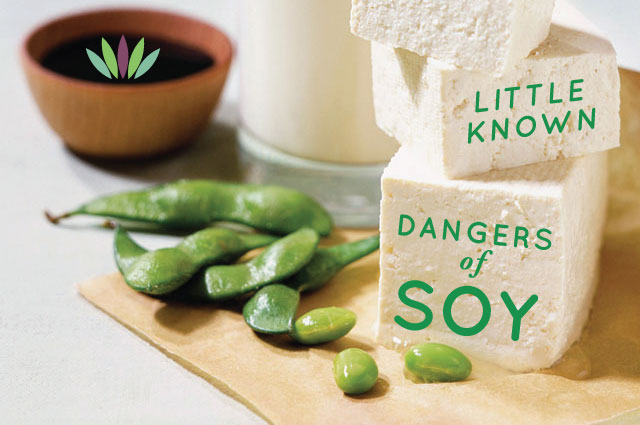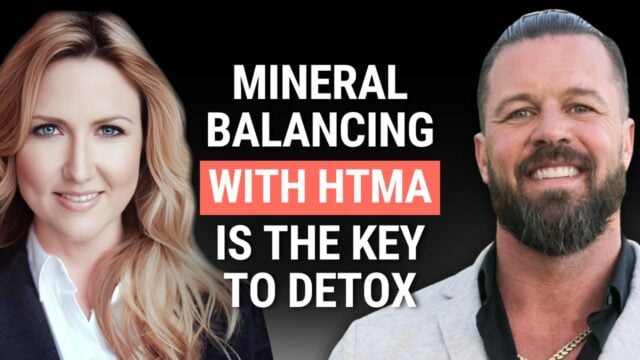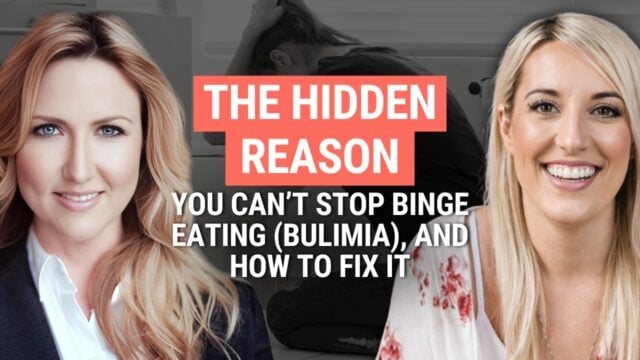Soy is not a health food. It should be avoided completely or eaten only on rare occasions and in fermented forms. The soybean is now being linked to breast cancer, thyroid disease, menstrual and fertility issues, as well as severe allergies, compromised immunity and brain damage.
Many countries, including Britain, Switzerland and Israel, have issued warnings to their citizens about the dangers of soy and soy infant formula. Due to millions spent on marketing, the food industry has managed to convert millions of soy consumers.
Over the past two decades, soy has been widely promoted as a miracle food that can prevent heart disease, fight cancer, reduce hot flashes and build strong bones. As a result, soy’s sales are billions in the US. Although growth of soy sales has slowed, sales aren’t reducing and the soy industry has been stepping up its marketing of products all over the world. The marketing of soy as a health food has been so successful that few people realize that respected scientists have warned that possible benefits should be weighed against soy’s risks. Even researchers working for the soy industry have admitted at soy symposia that the ‘marketing is way ahead of the science’.
Interference with Hormones
The most serious problem with soy is the phytoestrogens. They are similar enough to estrogens to cause significant endocrine disruption in the body.
Phytoestrogens lock onto receptor sites for real hormones that the human body needs, like testosterone, estrogen, and progesterone. Soy protein contains a type of phytoestrogens called isoflavones. Isoflavones interfere with estrogen receptor sites causing premature periods in girls and promoting cancer (many cancers grow when there is an abundance of estrogen or estrogenic substances). In vitro studies suggest that isoflavones inhibit synthesis of estrogen and other sex hormones.
Menopausal women should not consume soy products in an attempt to control hot flashes and other side effects of menopause. There are far safer alternatives to increase your levels of estrogen or optimize your estrogen/progesterone ratio — a common cause of undesirable side effects. Am I the only person who thinks that interfering with a person’s natural hormones is a self-evidently bad idea?
Soy further interferes with hormones, having contraceptive effects. In men, soy lowers testosterone levels, and reduces the quantity and quality of sperm. Couples trying to conceive should absolutely eliminate soy. Some cultures use soy to reduce the chance of pregnancy and to lower libido. It’s very popular in Buddhist monasteries with monks that have taken a vow of celibacy. Want to increase your libido? Eliminate soy from your diet.
Many suggest that fermented soy is okay to eat. Long, slow fermentation (as in the traditional production of miso, tempeh and soy sauce) gets rid of the phytic acid and other digestive inhibitors but not the phytoestrogens in soy.
For more information about the problems of Estrogen Dominance to which soy contributes, read my article Estrogen Dominance Syndrome.
Soy Causes Nutritional Deficiencies
The first troubling group of anti-nutrients in soy are called the phytates. Phytates bind to minerals like zinc, calcium, magnesium, iron and copper, and may strip them from the body, resulting in mineral deficiencies. Phytates block the absorption of nutrients from soy, so that any possible benefit is effectively negated. Soy also contains protease inhibitors, inhibiting some of the key enzymes that help us digest protein. Many plants are protected by toxic anti-nutrients such as these to ward off insects and animals that might otherwise eat them.
Thyroid Problems
The thyroid can be very negatively impacted by soy, with soy contributing to low thyroid function and even thyroid cancer. The thyroid controls your metabolism and energy. When it isn’t functioning properly, you can experience weight gain, low energy, and fertility can be affected. When the thyroid is compromised, it may enlarge in an attempt to absorb necessary missing nutrients, resulting in a mass called a goiter.
Soy inhibits the thyroid’s uptake of iodine, the thyroid’s food, thus driving up thyroid stimulating hormone (TSH) in an attempt to boost thyroid function. Japanese researchers reported that consumption of as little as 30 grams or 2 tablespoons of soybeans per day for only one month resulted in a significant increase in thyroid stimulating hormone—a sign of impaired thyroid function.
Genestein and diadzen, the isoflavone molecules in soy, inhibit an enzyme involved in thyroid hormone synthesis and may suppress thyroid function as well. The British Committee on Toxicity of Chemicals in Food, Consumer Products and the Environment identified infants on soy formula, vegetarians who use soy as a primary source of protein, and adults trying to prevent disease with soy foods and soy supplements as being at risk for thyroid damage.
Avoid Soy When Pregnant
Soy can cause the most damage during pregnancy and infancy. Sadly, its negative effects rarely show up until puberty. Eating soy while pregnant can impair your child’s fertility when they are adults and cause genital deformities, especially in boys, who are more sensitive to estrogen in utero. This is why male babies are 8 times more likely to suffer genital deformities.
When baby boys are fed soy formula, the estrogens cause boy’s physical maturation to be delayed or not happen at all. Pediatricians are reporting that record numbers of boys reach teenage years with underdeveloped gonads, undescended testicles, low sperm counts, and low sex hormones. Researchers have had to come up with new terms to describe the clusters of birth defects, increased susceptibility to hormonal diseases, and altered behavior patterns that occur in estrogenized boys. They call it “Developmental Estrogenization Syndrome.” They could make things easy and just call it Soy Syndrome.
Baby girls become over-estrogenized by soy as well, leading to early puberty, reduced fertility, menstruation problems, and prematurely enlarged breasts. Of course, there are many estrogenic substances in the environment contributing to these symptoms, but mass soy consumption is definitely a major part of the picture.
Avoid Soy Infant Formula
Soy infant formula is one of the most insidious consequences of the food industry’s drive to profit. Soy infant formula can cause lifelong allergies, autoimmune thyroid disease, asthma, and attention deficit disorder. Soy damages the nervous system in infants by killing brain cells, specifically in the hippocampus, the area responsible for memory and learning — not what you’re looking for, I believe, in your growing child. Soy is very high in manganese (50-80 times the amount found in dairy formula), which is toxic to infants and children. Manganese toxicity, negatively impacts the development of the brain and nervous system, mimicking autistic symptoms, causing ADD/ADHD and other learning and behavioral disorders.
Soy-based formula contains 130,000 times more isoflavones than human breast milk, providing 38 mg of isoflavones a day. This is the equivalent of three to five birth control pills a day. This is, to say the least, alarming. To put this in perspective, consider birth control Yasmin side effects in patients taking correct prescribed doses of birth control. According to drugnews.net, what is considered a safe dose can still lead to stroke or the formation of blood clots.
Soy infant formula should never be used except as a last resort, but sadly soy formula now represents about 25 percent of the bottle-fed market. Criminally, soy infant formula is routinely distributed to low-income women whose children have shown no aversion to dairy infant formula.
Think Soy Protein is Healthy? Think again…
Most people unwittingly eat soy protein isolate or textured soy protein in the form of protein powders, veggie burgers, vegetarian fake meats, etc. How is soy protein isolate made? After removing the fiber, the beans are put in an aluminum pot with an acid wash. They absorb the aluminum (linked to dementia and Alzheimer’s) and then are treated with many chemicals including nitrates (linked to cancer). Some amino acids (proteins) are destroyed; others are rendered toxic and carcinogenic. Free glutamic acid, or MSG, is produced during the processing of soy protein isolate, while more is usually added to many soy products. The soy protein isolate is then mixed with various binders, gums, fats, flavors, and sweeteners. Hungry for that protein shake now? Soy protein fibers are difficult to digest, have a scouring effect on the GI tract and cause a marked amount of flatulence.
This soy protein isolate powder is in up to 60% of processed foods, including soymilk and infant formula. Read labels of the processed food you’re eating. Soy protein isolate was originally ruled safe for use as an ingredient in cardboard. Researchers were worried the nitrosamines (liver damage and cancer) might leach from the cardboard container into food. Forty years later, the cardboard is safer to eat than the food.
Soy milk is a highly processed food and should never be consumed. It is not easy turning soybeans into milk. High heat and processing deform the soy proteins, making them very difficult to digest and unrecognizable by the body. Soy’s polyunsaturated fats become rancid because of an enzyme in the bean. Soy milk’s undesirable sour, bitter, and astringent characteristics come from oxidized phospholipids (rancid lecithin), oxidized fatty acids (rancid soy oil), and the soy estrogens known as isoflavones. The last are so bitter, sweeteners and flavorings have to be added. The only way to make soy milk palatable is to remove the very toxins, the isoflavones, that the food industry has promoted as beneficial for preventing cancer and lowering cholesterol. What results from this process has to be fortified, usually by adding a very hard to absorb forms of calcium and synthetic Vitamin D2, not D3, the form our bodies need. This ‘milk’ also suffers the addition of emulsifiers and stabilizers to keep all these substances from separating. Luckily, I instinctively shied away from soy milk years ago when I had horrible gas after consumption.
Over 90% of Soy is GMO
On top of all these frightening facts, ninety percent of the world’s soy production is genetically modified. GMO, genetically modified, soy has higher levels of protease inhibitors and higher levels of pesticides. Soy is now one of the top eight allergens, namely due to GMO soy coming on the market in the ’90’s. The altered genetics of GMO soy have increased allergies because it is viewed by the body as a foreign entity — not a food for consumption. Some are so sensitive they can’t even go to the grocery store because they are surrounded by soy. If you don’t buy organic, you’re almost certainly consuming soy that is proven to lower immunity, cause infertility, and damage organs in animals. Organic soybeans are problematic as well, possessing all the same problems mentioned in this article.
This is what you’re eating when you eat soy: an industrial waste product. Once upon a time, soy was grown for its oil — not because people ate it, but because it was used for paint and glue. Extracting the oil from soy leaves a defatted mass of protein. The food industry developed a way to use it. Turn it into cheap soy fillers and put it in every food found in the supermarket. There’s lots, lots more I can add to this debate. There are excitotoxins, heterocyclic amines, furanones, chloropropanols, and hexanes. Don’t know what they are? Then don’t eat them. More importantly, don’t let your children eat them.
Soy Dangers Summarized
- High levels of phytic acid in soy reduce assimilation of calcium, magnesium, copper, iron and zinc. Phytic acid in soy is not neutralized by ordinary preparation methods such as soaking, sprouting and long, slow cooking. High phytate diets have caused growth problems in children.
- Trypsin inhibitors in soy interfere with protein digestion and may cause pancreatic disorders. In test animals, soy containing trypsin inhibitors caused stunted growth.
- Soy phytoestrogens disrupt endocrine function and have the potential to cause infertility and to promote breast cancer in women.
- Soy phytoestrogens are potent antithyroid agents that cause hypothyroidism and may cause thyroid cancer. In infants, consumption of soy formula has been linked to autoimmune thyroid disease.
- Vitamin B12 analogs in soy are not absorbed and actually increase the body’s requirement for B12.
- Soy foods increase the body’s requirement for vitamin D.
- Soy infant formula can cause lifelong allergies, autoimmune thyroid disease, asthma, and attention deficit disorder.
- Fragile proteins are deformed during high temperature processing to make soy protein isolate and textured vegetable protein, making them very difficult to digest.
- Processing of soy protein results in the formation of toxic lysinoalanine and highly carcinogenic nitrosamines.
- Free glutamic acid or MSG, a potent neurotoxin, is formed during soy food processing and additional amounts are added to many soy foods.
- Soy foods contain high levels of aluminum that is toxic to the nervous system and the kidneys.
Health Problems Summarized
- Thyroid problems: including weight gain, lethargy, depression, fatigue, hair loss, and loss of libido
- Premature puberty
- Weight gain
- Estrogen Dominance Syndrome
- Developmental delays and problems in babies, children, and adolescents
- Asthma
- Causes and exacerbates endometriosis
- Cancer
- Brain damage, reducing production of new brain cells
- Dementia
- Reproductive disorders
- Reduced Fertility
- Kidney stones
- Weakened immune system
- Severe food allergies
- Man boobs and reduced sex drive in men
Practice Safe Soy
Many Americans get 9% of their calories from soy. This sad fact is due to food manufacturers using soy fillers in processed foods because it’s cheap and increases their profit margin. Be a smart consumer and aim to reduce your consumption of soy with the following tips:
- Eat only non-GMO fermented soy products like miso, natto, tempeh, and unpasteurized shoyu and tamari (high quality soy sauces). The processing and fermentation methods mitigate the anti-nutrient effects and reduce soy allergens, making them digestible and even healthy, albeit in limited quantities. Please be aware that long, slow fermentation (as in the traditional production of miso, tempeh and soy sauce) gets rid of the phytic acid and other digestive inhibitors but not the phytoestrogens in soy.
- Beware of tofu! Tofu is a precipitated product and not fermented. A few cubes in your soup may be okay. A half-pound slab, too much! In Japan, tofu is significantly more cultured (fermented) with a much stronger taste than it is here in the states. American tofu should be eaten in moderation.
- Avoid soy milk, soy cheese and other processed soy foods.
- Soy milk is the worst ‘milk’ in the marketplace. Try hemp, almond, and coconut milk, but keep in mind these products are high in sugar and full of unhealthful flavorings and additives. Better to make nut milk at home! See my blog on Homemade Nut Milk.
- Processed soy is in 60% of processed foods and almost 100% of fast foods. Look at the McDonald’s ingredient list. The word soy shows up 315 times.
- Use soy as a condiment, like soy sauce. Soy is traditionally eaten in Asia as a condiment, not as whole meals or a replacement for animal foods. Contrary to what you might think, Asian cultures do NOT eat tons of soy! Soy is eaten in tiny quantities (1-2 tablespoons a day) in the forms of miso, natto, soy sauce, and tempeh, and is usually fermented to mitigate its anti-nutrient qualities.
- Beware when eating in Asian restaurants as most use soybean oil, almost always GMO, in preparing food.
- Don’t eat anything squeezed out of an extruder — the technology used to make puffed cereal grains or O’s. You wouldn’t eat styrofoam packing materials or plastic toys, would you? Textured vegetable protein and some soy protein isolate products are manufactured using virtually the same technology. This process, forcing food through holes with high heat and pressure, destroys the proteins, making them unrecognizable by the body.
- Hydrolyzed plant protein is usually soy. Hydrolyzed whey, corn, wheat and other products are every bit as bad.
- Soy should not be your main source of protein.
- Avoid soy or isoflavone supplements.
- Allergic to soy? Read labels and avoid them at all costs. More than 60 percent of processed supermarket and health food store products contain soy ingredients. Nearly 100 percent of fast foods contain soy. Although most allergic people attempt to stay soy free by reading labels, a better way is to cook “real foods” from scratch. This avoids the risks of mislabeled and cross-contaminated products.
- Suffering from digestive distress, thyroid problems or disease, cancer, reproductive disorders or infertility? You will want to avoid soy completely.
Do you have a story about soy? I want to know about it! Have a question? Tell me your story by leaving a comment below.









